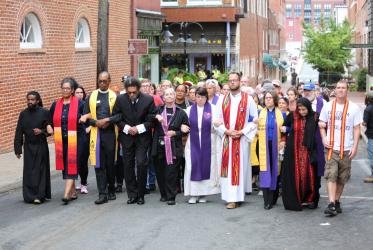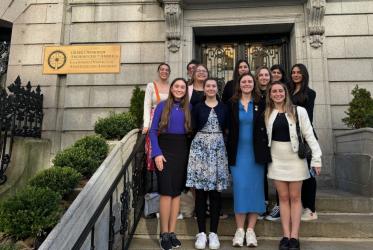During a webinar on 9 September entitled “Racism, Xenophobia and Discrimination in North America,” speakers and listeners across the world explored how we define racism, and how we can create a culture of inclusive communities.
Rev. Dr Angelique Walker-Smith, a member of the World Council of Churches (WCC) Central Committee, spoke of the consequences of slavery. Those include, she said, “robbery of identities of people of African descent, the legacy of resistance that has not accepted unjust practices and policies that have mitigated against the interest and prosperity of people of African descent, and inequitable polices and practices targeted against people of African descent.”
Walker-Smith is the national senior associate for Pan African and Orthodox Church Engagement at Bread for the World, based in Washington D.C..
Archbishop Mark MacDonald, WCC president for North America, is the Anglican Church of Canada’s first national indigenous Anglican bishop. He expressed appreciation for the webinar for addressing current challenges.
"I'm very grateful to be part of this discussion,” he said. "Canada, along with the rest of North America, is in the midst of a massive and urgent struggle for truth, justice and reconciliation.”
Seth Wispelwey, interim pastor at Rincon Congregational United Church of Christ in Tucson, Arizona (USA), reflected on the “national DNA” of the USA. “White supremacy and whiteness as an ideology have been baked into the national DNA of the United States of America since its inception as a nation state, and white supremacy intersects with three other dominant spiritualities that comprise our national religion: patriarchy, militarism, and consumer capitalism. Those all infuse our national DNA."
Speakers at the webinar included representatives of the National Council of Churches of Christ in the USA and the Canadian Council of Churches.
Moderating the webinar were Prof. Evelyn Parker, a commissioner with the WCC Commission of the Churches on International Affairs, and professor of Practical Theology at the Perkins School of Theology; and Rev. Michael Blair, executive minister on Church in Mission at the United Church of Canada.
Parker reflected on liturgy: "I am learning about the power of liturgy and how it can transform people about issues," she said. "It doesn’t have to be high liturgy but just the inclusion, in addition to the sermon, poetry and stories and varied aspects during the worship environment that teach and keep the issues in the forefront.”
Blair said he wants people to realize this dialogue is occurring as part of a growing continuum. “We recognize that not all the voices that experience racism and xenophobia are present in this conversation," he said. "This is the start of the conversation, not the end of the conversation.
Segma Asfaw, WCC programme executive, also expressed a hope in the continuity of results from these kinds of dialogues. “Through this series of eight regional webinars, our hope is to explore the various causes and manifestations of racism, xenophobia, afrophobia and racial discrimination in different parts of the world, to identify what are the common threads across regions, and find opportunities for collaboration to address this plague.”







